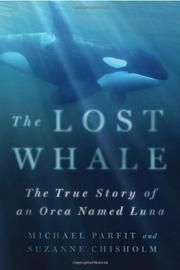Friends
Luna: A Lost and Lonely Whale Desperately Seeking Love
A new book and timeless documentary tell the story of Luna's search for friends
Posted June 21, 2013
I am so pleased to inform readers of a new book called The Lost Whale: The True Story of an Orca Named Luna, by Michael Parfit and Suzanne Chisholm. For years I've watched, re-watched, and shared widely the wonderful documentary called "The Whale" (see also), a deep and heartwarming story about young Luna's (also called L98) search for friends and love after he became separated from his pod.

The review of this lovely and beautifully written book captures it all: "One summer in Nootka Sound on the west coast of Vancouver Island, British Columbia, a young killer whale called Luna got separated from his pod. Like humans, orcas are highly social and depend on their families, but Luna found himself desperately alone. So he tried to make contact with people. He begged for attention at boats and docks. He looked soulfully into people's eyes. He wanted to have his tongue rubbed. When someone whistled at him, he squeaked and whistled back. People fell in love with him, but the government decided that being friendly with Luna was bad for him, and tried to keep him away from humans. Policemen arrested people for rubbing Luna’s nose. Fines were levied. Undaunted, Luna refused to give up his search for connection and people went out to meet him, like smugglers carrying friendship through the dark. But does friendship work between species? People who loved Luna couldn't agree on how to help him. Conflict came to Nootka Sound. The government built a huge net. The First Nations’ members brought out their canoes. Nothing went as planned, and the ensuing events caught everyone by surprise and challenged the very nature of that special and mysterious bond we humans call friendship. The Lost Whale celebrates the life of a smart, friendly, determined, transcendent being from the sea who appeared among us like a promise out of the blue: that the greatest secrets in life are still to be discovered."
This wonderful and inspirational book has been widely and very positively received. A review in Kirkus Reviews calls it "A tender, nail-biting account of an orca’s fate as the Canadian Fisheries and Oceans Department considered trapping and sending him to captivity." And in Publishers Weekly we're told, “Luna’s story brings a thorny dilemma to the table—what should humanity’s role toward nature be?—and the book does a surprisingly good job of showing the range of emotions behind that question.”
Who are we, who are "they", and what do they want and need?
The Lost Whale and documentary raise just about all of the important questions we ponder about who we are and who "they", other animals, are. I've used Luna's story in courses I teach and also in discussions about the challenging, frustrating, complex, and paradoxical nature of human-animal relationships (anthrozoology), and when asking just what do other animals think, know, and feel, and what do they want and need. There are discussions about whether animals can form friendships (of course they can), for example, and are we "humanizing" them by claiming they do want friends and that we know what they want and need. There are also debates about what we owe to wild animals who are seeking us out because we're their only outlet for showing compassion, empathy, and love. Should we leave them alone or allow them to enter our world when we are their only possible friends? And, there are wonderful and much-needed discussions about cultural differences in our attitudes toward other animals, for example, between people working for various government organizations (who differed among themselves, some wanting to condemn Luna to a life in captivity at the Vacouver Aquarium for a lot of money, some wanting to find his pod, and some favoring simply to let him be) and members of the Mowachaht/Muchalaht First Nations.
Luna as the poster child for a Universal Declaration on Animal Sentience: Look into his eyes and you know what he feels, needs, wants, and want to give in return
As I've stressed in many of my other Psychology Today essays and more recently in my call for a Universal Declaration on Animal Sentience, we now have and indeed have had for years ample scientific evidence that shows that other animals want to live in peace and safety and also want and need friends and to receive and to give love. Luna could easily be the poster child for this declaration, as could numerous other animals who find themselves struggling to live in a human-dominated world.
Luna's eyes tell it all. When you look into his eyes and watch him playfully and unrelentingly seek out the only potential friends who are available to him, humans, you know exactly what he wants and needs. It's not rocket science to feel the depth of his loneliness.
The last sentence of The Lost Whale captures it all. The authors write, "So, to Luna, thank you for what you gave to all of us to help understand the nature of living, the depth of the spring of time from which it rises, and the importance of loneliness and empathy that we share and weld into friendship; and thank you Jamie, and all these others, for what you gave Luna." (Jamie James, the Mowachaht/Muchalaht First Nations fisheries manager, was Luna's best and most consistent friend.)
The Lost Whale, the documentary, and other videos about Luna are simply incredible and must be read and seen by anyone who is interested in our relationships with other animals, their emotional lives, and their drive to form reciprocal and deep friendships with other beings.
The teaser image comes from a must-see video called "a wild orca plays with human friend.mp4."


